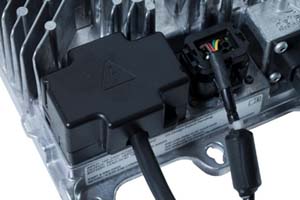 Delta-Q Technologies has announced the availability of CAN bus communication functionality for the IC650 Industrial Battery Charger. CAN bus functionality facilitates communication between the IC650 Charger and other electric drive vehicle or machine components, enabling safe and efficient on-board charging of lead acid and lithium battery packs.
Delta-Q Technologies has announced the availability of CAN bus communication functionality for the IC650 Industrial Battery Charger. CAN bus functionality facilitates communication between the IC650 Charger and other electric drive vehicle or machine components, enabling safe and efficient on-board charging of lead acid and lithium battery packs.
The IC650 Charger is available in 24 V, 36 V and 48 V models and provides 650 watts of constant DC output power. “Comm” versions of the IC650 Charger have the necessary communication port to support CAN bus programming.
Delta-Q’s implementation of CAN bus uses an isolated CAN bus physical layer with a CANopen protocol stack. Delta-Q currently supports the CiA 419 (charger) device profile, with plans to implement the CiA 454 (light electrical vehicles) device profile. Delta-Q has also added manufacturer specific parameters to allow greater control and monitoring by external systems. Using an isolated CAN bus implementation simplifies the system integration process, as it provides original equipment manufacturers (OEMs) the flexibility to reference whatever voltage potential is convenient for them (e.g. battery positive or battery negative).
Using CAN bus in lithium applications, the IC650 Charger is a slave to the battery management system (BMS), with the BMS monitoring individual cell voltages and temperatures and controlling the charging process. This monitoring and control prevents overcharging and ensures that the battery cells remain balanced. For lithium ion battery chemistries (e.g. LiFePO4), using CAN bus benefits users, vehicle safety and battery longevity.
Many original equipment manufacturers (OEMs) of golf cars, lift trucks, aerial work platforms, floor machines, utility vehicles and scooters, are developing machines that employ lithium batteries. Lithium batteries are being considered for deep cycle applications because of their energy density, and reduced size and weight (compared to lead acid batteries). Safety concerns associated with lithium battery usage creates the need for a highly integrated system using a charger with CAN bus functionality.
CAN functionality can also be used in lead acid battery applications. In these applications, the IC650 Charger charges the batteries independent of other vehicle components, but charger information is communicated over the CAN network to be used by other CAN devices (e.g. the main vehicle controller) to operate display panels, safety interlocks or provide data collection to custom service tools.
Cable harnesses can be provided by Delta-Q, or sourced by an OEM customer. CAN bus functionality can be used in both an on- and off-board implementation of the IC650 Charger.
CAN in Automation (CiA) is a non-profit organization that administers the standards. CAN stands for “Controller Area Network” and is an open network protocol used widely in industrial automation.







